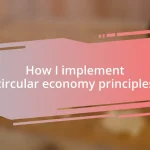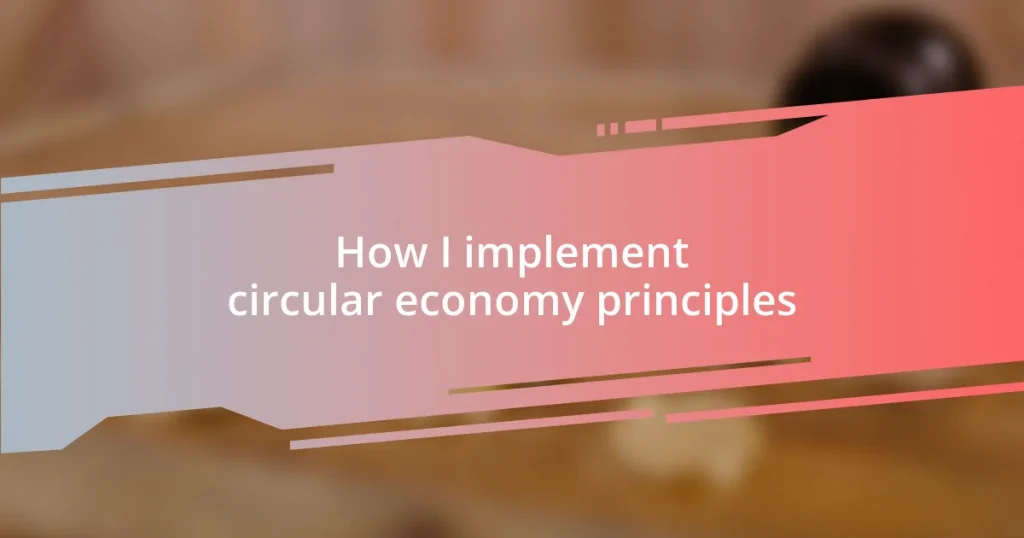Key takeaways:
- Emotional connection and relatable stories enhance audience engagement and make presentations more impactful.
- Understanding a speaker’s goals and background is crucial for aligning their delivery with the event’s objectives.
- Budget considerations should focus on the overall value a speaker provides, including interactive elements and follow-up opportunities.

Understanding personal preferences
Understanding my personal preferences when choosing speakers has always been a nuanced journey. I remember attending a conference once where the speaker seemed really knowledgeable but lacked the energy that keeps the audience engaged. Have you ever sat through a presentation that felt too monotonous? It’s moments like these that highlight how vital it is for speakers to connect emotionally with their audience.
I find that my preferences lean towards speakers who share personal stories. These anecdotes add a layer of authenticity that makes the content more relatable. For example, I once heard a motivational speaker share their struggles with failure before achieving success. It resonated with me deeply, as it reminded me of my pivotal challenges. Doesn’t it make the message stronger when the speaker admits their vulnerabilities?
The delivery style also plays a crucial role in my selection. I gravitate towards speakers who use humor and a conversational tone. It creates an atmosphere that feels less like a lecture and more like a chat with a wise friend. Have you noticed how a good laugh can break down barriers? It encourages openness and engagement, making the information not only easier to absorb but also more memorable.

Identifying speaker goals
Identifying the goals of a speaker is crucial for setting the right tone for any event. I once hosted a panel, and each speaker had different objectives—some aimed to inspire, while others sought to inform or entertain. It was eye-opening to see how distinct these goals shaped their presentations. Knowing what a speaker hopes to achieve influences not just their delivery but also the audience’s engagement level.
To clarify speaker goals, I find it helpful to consider these aspects:
- Purpose: Are they trying to educate, motivate, or entertain?
- Audience: Who are they speaking to, and what do the listeners need?
- Takeaways: What specific insights or actions do they want the audience to leave with?
- Connection: How do they intend to connect emotionally with their audience?
Understanding these elements ensures that the right speaker aligns with the event’s objectives, making the experience richer for everyone involved.

Researching different speaker types
When researching different speaker types, I’ve found that it’s essential to explore various delivery styles and thematic focuses. For instance, some speakers are skilled storytellers, weaving tales that keep the audience on the edge of their seats, while others may adopt a data-driven approach, presenting facts and statistics. I once encountered a speaker who relied heavily on data; while the information was impressive, I found myself disengaged without the emotional connection that stories tend to provide. Have you experienced presentations where the stats outweigh the soul?
The background of a speaker can significantly influence their effectiveness. There’s a vast difference between industry experts who share insights from years of experience and charismatic speakers who simply know how to entertain. I recall an event where a tech founder spoke about innovation. Their passion and firsthand experience made the technical jargon much more accessible, unlike previous panels I had attended that felt more like a classroom lecture. Isn’t it fascinating how personal experiences can reframe complex topics?
I also find it useful to consider what unique perspectives different speaker types bring to the table. Creating a well-rounded speaker lineup often leads to a more enriching experience for the audience. For example, including a motivational speaker alongside a subject matter expert can balance inspiration with information. Such contrasts can drive home the message more powerfully. Have you noticed how diverse viewpoints can spark vibrant discussions?
| Speaker Type | Description |
|---|---|
| Storyteller | Engages through personal anecdotes and emotional connections |
| Industry Expert | Presents data and deep insights from their field |
| Motivational Speaker | Inspires and energizes the audience, often through powerful messages |
| Entertainer | Uses humor and charisma to keep the audience engaged |

Evaluating speaker experience and credentials
Evaluating a speaker’s experience and credentials is essential in determining their suitability for your event. I remember when I was tasked with selecting a keynote speaker for a corporate retreat. I dug into their background—checking their previous speaking engagements, the types of organizations they’ve worked with, and their accolades. This research proved invaluable; a speaker with a proven track record can create a sense of trust and authority that captivates the audience right from the start. Have you ever noticed how the right credentials can completely shift the atmosphere in the room?
It’s also important to look beyond mere qualifications. A speaker could have impressive degrees but lack real-world experience. I once attended a webinar with a renowned expert who had all the right credentials, yet their anecdotes felt disconnected from everyday realities. Their theoretical knowledge didn’t resonate with me or fellow attendees, who were looking for actionable insights. In contrast, I was blown away by a speaker who shared their journey—failures and triumphs alike—and how those experiences shaped their viewpoints. Don’t we all appreciate when someone truly understands the challenges we face?
Finally, pay attention to their speaking style and audience engagement. Credentials alone won’t keep the audience invested. I had a mentor who had a medical degree and spoke at health conferences, drawing large crowds. Yet, what made her memorable wasn’t the degree; it was her ability to weave in relatable stories that kept us engaged. Have you ever left a presentation feeling inspired simply because of the speaker’s passion? That enthusiasm often stems from firsthand experience, which can obscure those shiny credentials if not backed by connection and relatability.

Considering audience engagement techniques
When I think about audience engagement techniques, I often recall a panel discussion I attended where each speaker utilized various methods to capture attention. One speaker invited audience members to share their own stories, creating an interactive dialogue that transformed the atmosphere. This connection made it feel like we were part of the conversation, rather than just passive listeners. Have you ever felt that spark when a speaker opens the floor to audience participation?
Visual aids can also enhance engagement, a lesson I learned firsthand at a workshop focused on creative presentation techniques. The facilitator used vibrant images and infographics alongside their talking points, which painted a clearer picture of the concepts being discussed. I noticed how the audience’s energy shifted; when visuals complemented the narrative, everyone was more focused and engaged. Have you ever found that a compelling visual can make a complex idea much more digestible?
Lastly, I’ve found that humor can be a powerful engagement tool. During a recent conference, a speaker kicked off their talk with a lighthearted joke that instantly put everyone at ease. That simple act of levity created a bond, making the audience more receptive to the messages that followed. It always amazes me how a laugh can break down barriers. How much more connected do you feel to someone who can elicit a chuckle from you?

Budgeting for speaker fees
Budgeting for speaker fees is a crucial step in planning any event. I’ve learned that having a clear understanding of your budget can prevent overspending while still allowing for quality speakers who can truly resonate with your audience. For instance, during a non-profit gala I organized, we set a maximum fee upfront, which helped us focus our efforts on finding speakers who not only fit our budget but also aligned with our mission. How do you prioritize between funding a high-profile speaker versus multiple impactful ones?
When choosing speakers, I’ve found it helpful to consider not just their fee but the overall value they bring to the table. I remember a workshop where our main speaker was within budget but also offered a follow-up Q&A session that proved invaluable. Those added interactions extended the learning experience beyond their presentation, making us feel like the investment was well worth it. Have you thought about how extra services, like tailored workshops or one-on-one sessions, could enhance your overall event value?
Another strategy I’ve adopted is to compare fees across a range of speakers. At one event, I reached out to emerging talents who were just starting their speaking careers. They not only had fresh perspectives but also charged significantly less. This experience taught me that great speakers come in all price ranges, and sometimes those who are less known can deliver just as much impact—if not more—than their more expensive counterparts. Have you ever discovered a hidden gem whose insights changed everything for you?















